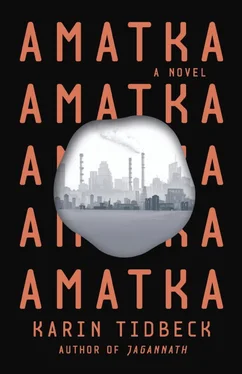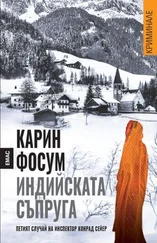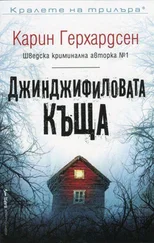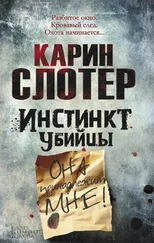Карин Тидбек - Amatka
Здесь есть возможность читать онлайн «Карин Тидбек - Amatka» весь текст электронной книги совершенно бесплатно (целиком полную версию без сокращений). В некоторых случаях можно слушать аудио, скачать через торрент в формате fb2 и присутствует краткое содержание. Город: New York, Год выпуска: 2017, ISBN: 2017, Издательство: Vintage Books, Жанр: Фантастика и фэнтези, на английском языке. Описание произведения, (предисловие) а так же отзывы посетителей доступны на портале библиотеки ЛибКат.
- Название:Amatka
- Автор:
- Издательство:Vintage Books
- Жанр:
- Год:2017
- Город:New York
- ISBN:978-1-101-97395-0
- Рейтинг книги:4 / 5. Голосов: 2
-
Избранное:Добавить в избранное
- Отзывы:
-
Ваша оценка:
- 80
- 1
- 2
- 3
- 4
- 5
Amatka: краткое содержание, описание и аннотация
Предлагаем к чтению аннотацию, описание, краткое содержание или предисловие (зависит от того, что написал сам автор книги «Amatka»). Если вы не нашли необходимую информацию о книге — напишите в комментариях, мы постараемся отыскать её.
Amatka — читать онлайн бесплатно полную книгу (весь текст) целиком
Ниже представлен текст книги, разбитый по страницам. Система сохранения места последней прочитанной страницы, позволяет с удобством читать онлайн бесплатно книгу «Amatka», без необходимости каждый раз заново искать на чём Вы остановились. Поставьте закладку, и сможете в любой момент перейти на страницу, на которой закончили чтение.
Интервал:
Закладка:
“What makes you think that?”
“They never brought any bodies back. They said they’d dug a mass grave out there, but I don’t believe it for a second. Nobody would leave a hundred bodies out there when they could be recycled. We could never afford it.” Evgen let out a long breath. “And I think, now that the committee is coming after the library… I think something is happening up here. Something big. I think the committee’s afraid that whatever happened with Berols’ Anna’s people will happen here, too.”
“They need the good paper for something.”
“Yes, exactly. It’s for documents and books, after all, for things that mark. That define. And they need lots of it. I’ve never seen anything like it.”
“Can’t you find out?”
“Hardly. I’m not on the committee anymore. But you could. You’ll be able to go through the archives. You’ll be able to find out what they want with all the paper.”
“And if I can find that out…”
“…then we can figure out what they’re planning.”
Evgen looked Vanja in the eye. “And you can help me find information about what happened with Anna’s colony. Because if they succeeded, we have to learn how to do it. So we can do more than just survive. I mean, the way things are now—we’re alive, but what kind of life is it?”
“We speak of new worlds, we speak of new lives, we speak to give ourselves, to become,” Vanja mumbled.
“What’s that?” Evgen said.
“It’s a poem,” Vanja said. “By Berols’ Anna.”
“I’m not familiar with that.”
“It was in a book I found at Ulla’s apartment.”
“Huh,” Evgen said. “I’d like to read that.”
“You would have to speak to Ulla.”
“Who is this Ulla?”
“A retired doctor,” Vanja said. “She says she knew Anna back in the day.”
“That’s very interesting,” Evgen said. “You should talk to her more.”
“I am,” Vanja said.
“What has she said?”
Vanja hesitated. “I’m not sure.”
Evgen studied her. “Get back to me when you’re sure, then.”
The house was quiet and empty when Vanja returned. Ivar and Nina would come home alone; the children were always fetched from the rec center on Sevenday evening so they could start the week in their own beds at the children’s houses. Vanja crawled into Nina’s bed and lay awake until she heard footsteps on the stairs. Nina came into the room, moving as quietly as she could. Vanja heard clothes fall to the floor. Then Nina crawled in under the duvet. She slid an arm around Vanja’s waist. Her touch spread warmth through Vanja’s limbs, relaxing her tense muscles.
When Vanja decided to find the place outside Essre that Lars had told her about, she’d walked eastward for what felt like hours. At first the plant-house ring lit the ground before her, but the light soon began to fade. Instead, a cold gleam appeared up ahead. The ground slowly rose into a ridge that glittered with night dew in the backlight. From the top, the ground sloped sharply down into a deep valley. And there it was: the village.
Surrounded by a low wall, the windowless houses were irregularly shaped, rounded and flowing, their domed roofs crowned with little symbols. Among the buildings spotlights mounted on tripods illuminated patches of walls and ground. Vanja could make out figures moving about. They looked small at first, like children, until she realized that it was because the houses were enormous. The thresholds reached the people walking around outside to their knees. Some of the houses seemed to have soft walls that draped into folds, but seeing a figure in overalls leaning against one of them, Vanja realized they were hard, too.
She crept closer to see better. None of the people walking around among the buildings seemed to pay much attention to their surroundings. No one seemed to be standing watch. Vanja crawled through the cold grass until she could crouch behind the wall and peek over the edge.
The men and women wore torn and dirty overalls. The men’s beards were unkempt, some long enough to reach their chests. They ambled aimlessly through the alleys or sat on the ground. No one spoke. Vanja jumped when a woman slowly turned her way and came closer. She waited for the woman to speak to her, or point and call out, or grab her. None of those things happened. The woman gawped at Vanja. Her black hair was dull and lank against her face. A thin string of saliva slowly dribbled down her chin and dripped onto her chest. Then her gaze moved on. She walked away.
Vanja crept along the wall, now and then peering over the top. It was the same everywhere: men and women silently and aimlessly shuffling about or leaning against the walls. The houses had no doors, just empty openings through which Vanja could glimpse beds and tables.
A man stepped out of one of the houses and into the light of a lamp. His overalls weren’t as soiled as the others, and his beard still fairly tidy. Vanja didn’t recognize him at first: his face was slack and expressionless, his eyes dry and lifeless. He was swaying. A dark stain slowly spread from his crotch down his legs.
Vanja ran back up the slope, away from the town and away from Lars, who wasn’t Lars anymore.
THE THIRD WEEK
FIRSTDAY
Vanja presented herself at the commune office at eight o’clock on Firstday morning. She was greeted by the gangly man in the reception, who introduced himself as Heddus’ Anders. He gave her a rundown of her tasks. He didn’t seem especially delighted with her presence. “You got this job because it was the most highly prioritized position you’re qualified for.” Anders pursed his lips. “And we have to follow the priority order.”
Vanja’s new job consisted of sorting and filing processed applications, reports, and certificates. Every change in a citizen’s life entailed paperwork: birth, relocation to the children’s house, relocation to a household, education, procreation, work, retirement, death. All work-related events had to be documented as well, of course: employment, resignation, production, results, accidents. The never-ending stream of paper was ferried back and forth by the couriers out of the distribution hub next door. Being a courier was an envied position, reserved for disciplined youngsters in peak physical shape, model specimens of humanity who usually went on to occupy coveted positions at the commune office and on the committee.
Most forms originated in the clinic, the children’s houses, the mushroom chambers, and departments inside the commune office. At the administration office, these were sorted, counted, and indexed, and the information they contained incorporated into the colony’s statistics. Very important papers, such as birth certificates, were copied onto good paper.
At midday, Anders showed Vanja to the commune office’s canteen, where stewed parsnip and some sort of agaric was on the menu. Anders sat down at a table together with a woman and two men from somewhere else in the office building. Vanja sat down next to him, was introduced to the others and then promptly ignored. It was a relief to be able to eat without having to make small talk. The others were busy discussing the imminent committee election: Who were the candidates? Who made a fool of themselves trying to get elected? Who looked like a promising choice? It eventually emerged that Anders was planning to run. Vanja wondered to herself what the others would say about him when they were out of earshot—that he was a suitable candidate, or that he was a moron.
In the afternoon, Anders put the box of forms she had gone through that morning in Vanja’s hands and led her to the back of the office, where he opened a gray door. Vanja followed him down a set of stairs and into a long room lined with filing cabinets. The only break in the long rows was another door, marked only with the sign DOOR. Documents concerning citizens were stored in the cabinets to the left, documents relating to the colony’s administration to the right. Vanja’s task was to sort citizens’ forms into the correct personal files.
Читать дальшеИнтервал:
Закладка:
Похожие книги на «Amatka»
Представляем Вашему вниманию похожие книги на «Amatka» списком для выбора. Мы отобрали схожую по названию и смыслу литературу в надежде предоставить читателям больше вариантов отыскать новые, интересные, ещё непрочитанные произведения.
Обсуждение, отзывы о книге «Amatka» и просто собственные мнения читателей. Оставьте ваши комментарии, напишите, что Вы думаете о произведении, его смысле или главных героях. Укажите что конкретно понравилось, а что нет, и почему Вы так считаете.












![Карин Тидбек - Аматка [ЛП]](/books/438406/karin-tidbek-amatka-lp-thumb.webp)